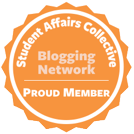|
Don't forget to check out the #NASPA16 hashtag this weekend on Facebook and especially Twitter. Lots of great professional development resources. Also #ACPA16 just wrapped up so be sure to check that out as well on Twitter. WNY Advising TEchnology ConferenceStay tuned next week for an update and our Call for Proposals for our WNY Advising Technology Conference on May 19, 2016.
The committee had a great first meeting and we are running with a number of new ideas this year which will make this conference even better. #wnyadvising
26 Comments
The following cross-posted blog developed from a question I asked Laura A. Pasquini, Ph.D. regarding an upcoming social media unit in my sociology of higher education class. Laura is a Niagara University alumna with whom I connected through WNY Advising and NACADA. If you are interested in #edtech, #edsocmedia, or #socmedia, I highly recommend following Laura on her blog, Techknow Tools, or on social media. --- John P. Sauter Jr., Ph.D.  Reprinted w. permission from Techknow Tools Laura A. Pasquini, Ph.D. Link to the Original Blog Post (2/22/15) I recently curated a reading list of literature/research on social media and technology use, specifically outside the higher ed “classroom” for a colleague at Niagara University,Dr. John Sauter. For his Sociology of Higher Education course, John wanted to share readings that demonstrate how social media and technology are being utilized outside formalized learning, and provide more information beyond the Social Media Resources [from the WNY Advising group] the practical guides/strategies. A recent prompt from my #edusocmedia friend Ove, made me think that this short list should be shared and hopefully expanded upon – enter this blog post. In searching online, you will find that there are no shortage of “how to” and “social media strategy” publications – which often bridge the marketing, communications, education, business, and student affair disciplines. A growing number of bloggers also share suggestions for social media use, community development, and campus engagement; however my focus was to find recent RESEARCH in post-secondary education that examined how social media and emerging technologies are impacting student life, support, and success outside the “classroom” (face-to-face, online & blended learning) environments. To consider social media perceptions and use outside of formal learning environments, it is important to gain insight from recent studies around learning in higher education with technologies, including: Junco, R., Heiberger, G., & Loken, E. (2011). The effect of Twitter on college student engagement and grades. Journal of computer assisted learning, 27(2), 119-132. Junco, R. (2012). Too much face and not enough books: The relationship between multiple indices of Facebook use and academic performance.Computers in Human Behavior, 28(1), 187-198. Junco, R., Elavsky, C. M., & Heiberger, G. (2013). PuttingTwitter to the test: Assessing outcomes for student collaboration, engagement and success. British Journal of Educational Technology, 44(2), 273-287. Junco, R. (2015). Student class standing, Facebook use, and academic performance. Journal of Applied Developmental Psychology, 36, 18-29. Muñoz, C. L., & Towner, T. (2011). Back to the “wall”: How to use Facebook in the college classroom. First Monday, 16(12). Roblyer, M. D., McDaniel, M., Webb, M., Herman, J., & Witty, J. V. (2010). Findings on Facebook in higher education: A comparison of college faculty and student uses and perceptions of social networking sites. Internet and Higher Education, 13(3), 134-140. Rodriguez, J. E. (2011). Social media use in higher education: Key areas to consider for educators. MERLOT Journal of Online Learning and Teaching, 7(4). Silius, K., Kailanto, M., & Tervakari, A-M. (2011). Evaluating the quality of social media in an educational context. International Journal of Emerging Technologies in Learning, 6(3), 21-27. Wakefield, J. S., Warren, S. J., Alsobrook, M., & Knight, K. A. (2013). What do they really think? Higher education students’ perceptions of using Facebook and Twitter in formal higher education learning. International Journal of Social Media and Interactive Learning Environments, 1(4), 330-354. **Shout out to Josie Ahlquist for also sharing a wealth of resources on her Reference List page related to this topic as well and more related to student development theory and youth culture in media!** My focus for this class reading list, was to find recent (2011 forward) peer-reviewed publications that share implications and findings from research on how social media impacts support/success in higher ed beyond the instructional context. Yes. Student affairs, academic advisors, and the like, in student support areas of higher ed, ARE educators – however social media/technology use for learning without the weight of the grade “carrot” does impact and influence adoption/use. In looking around, I found a number of recent literature reviews and compilations that look at social media in higher education – here are a select few I thought I would share: Davis III, C. H., Deil-Amen, R., Rios-Aguilar, C., & Gonzalez Canche, M. S. (2012). Social Media in Higher Education: A literature review and research directions. Hew, K. F., & Cheung, W. S. (2013). Use of Web 2.0 technologies in K-12 and higher education: The search for evidence-based practice. Educational Research Review, 9, 47-64. Lewis, B., & Rush, D. (2013). Experience of developing Twitter-based communities of practice in higher education. Research in Learning Technology, 21. Rios-Aguilar, C., Canché, G., Sacramento, M., Deil-Amen, R., & Davis III, C. H. (2012). The role of social media in community colleges. Tarantino, K., McDonough, J., & Hua, M. (2013). Effects of student engagement with social media on student learning: A review of literature. The Journal of Technology in Student Affairs. Tess, P. A. (2013). The role of social media in higher education classes (real and virtual)–A literature review. Computers in Human Behavior, 29(5), A60-A68. For my own interest, I decided to conduct a preliminary literature search to determine “How is social media being researched to support student development/success in higher education beyond the “classroom”? This is NOT a comprehensive list, but more of a primer to initiate a more comprehensive search for recent (2011 forward) scholarly publications involving research on this topic: Al-Harrasi, A. S., & Al-Badi, A. H. (2014). The Impact Of Social Networking: A Study Of The Influence Of Smartphones On College Students. Contemporary Issues in Education Research (CIER), 7(2), 129-136. Birnbaum, M. G. (2013). The fronts students use: Facebook and the standardization of self-presentations. Journal of College Student Development, 54(2), 155-171. Chen, B., & Bryer, T. (2012). Investigating instructional strategies for using social media in formal and informal learning. The International Review of Research in Open and Distributed Learning, 13(1), 87-104. Cheung, C. M., Chiu, P. Y., & Lee, M. K. (2011). Online social networks: Why do students use Facebook? Computers in Human Behavior, 27(4), 1337-1343. DeAndrea, D. C., Ellison, N. B., LaRose, R., Steinfield, C., & Fiore, A. (2011). Serious social media: On the use of social media for improving students’ adjustment. Internet and Higher Education, 15, 15-23. Fuller, M., & Pittarese, T. (2012, June). Effectively communicating with university students using social media: a study of social media usage patterns. In 45th Annual Conference June 10-14, 2012 (p. 46). Graham, M. (2014). Social Media as a tool for increased student participation and engagement outside the classroom in higher education. Journal of Perspectives in Applied Academic Practice, 2(3). Jacobsen, W. C., & Forste, R. (2011). The wired generation: Academic and social outcomes of electronic media use among university students. Cyberpsychology, Behavior, and Social Networking, 14(5), 275-280. Lin, M. F. G., Hoffman, E. S., & Borengasser, C. (2013). Is social media too social for class? A case study of Twitter use. TechTrends, 57(2), 39-45. Lou, L. L., Yan, Z., Nickerson, A., & McMorris, R. (2012). An examination of the reciprocal relationship of loneliness and Facebook use among first-year college students. Journal of Educational Computing Research, 46(1), 105-117. Joosten, T., Pasquini, L. A., & Harness, L. (2013). Guiding social media in our institutions.Planning for Higher Education – Society for College and University Planners. 41(2), 1-11. Mastrodicasa, J., & Metellus, P. (2013). The impact of social media on college students.Journal of College & Character, 14(1), 21-29. O’Brien, O., & Glowatz, M. (2013). Utilising a social networking site as an academic tool in an academic environment: student development from information-sharing to collaboration and innovation (ICI). AISHE-J: The All Ireland Journal of Teaching and Learning in Higher Education, 5(3). Pettijohn, T. F., LaPiene, K. E., & Horting, A. L. (2012). Relationships between Facebook intensity, friendship contingent self-esteem, and personality in US college students.Cyberpsychology, 6(1), 1-7. Ternes, J. A. (2013). Using social media to engage students in campus life. (Doctoral dissertation, Kansas State University). Sponcil, M., & Gitimu, P. (2013). Use of social media by college students: relationship to communication and self-concept. Journal of Technology Research, 4, 1-13. Wang, Z., Tcherneve, J. M., & Solloway, T. (2012). A dynamic longitudinal examination of social media use, needs, and gratifications among college students. Computers in Human Beheavior, 28(5), 1829-1839. If you have published any articles and/or have contributions for research in this area – please add to the list! Post any publication references in the comments or reach out to me to discuss further. I suspect this quest will continue, and it will also need a few collaborators to be successful. Are you interested in digging into the research to learn more about HOW we are SUPPORTING students in higher education using social media beyond formalized learning structures? Let’s talk – so we can move forward in understanding the research lay of the land. Click Here for the Original Blog Post, which includes comments & responses, including a link to additional citations from Paul Gordon Brown
|
WNY Advising
|





 RSS Feed
RSS Feed